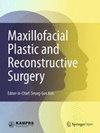Diagnostic value of presepsin in odontogenic infection: a retrospective study
IF 2.8
Q2 DENTISTRY, ORAL SURGERY & MEDICINE
Maxillofacial Plastic and Reconstructive Surgery
Pub Date : 2022-06-06
DOI:10.1186/s40902-022-00353-7
引用次数: 2
Abstract
Most head and neck infections originate from odontogenic causes; therefore, it is important to determine the severity of odontogenic infections. Since severe infection can cause sepsis, a systemic examination should be performed when evaluating a patient with odontogenic infection. C-reactive protein (CRP), white blood cell count (WBC), procalcitonin (PCT), and presepsin (PSEP) can be used to evaluate the severity of inflammatory status and sepsis in patients in the early stages of visiting the emergency room. Moreover, sepsis can be diagnosed based on the systemic inflammatory response syndrome (SIRS) classification. In relation to PSEP, significant study results on sepsis have been reported in other organ infections. However, there has been no progress in odontogenic infection; therefore, this study aimed to determine the diagnostic value of sepsis derived from odontogenic infection. This study was conducted from March 2021 to October 2021 on 43 patients admitted to the Department of Oral and Maxillofacial Surgery, Dankook University Hospital, in the emergency room for odontogenic infection. All patients underwent vital sign assessment and diagnostic tests (CRP, WBC, PCT, PSEP) in the emergency room. Sepsis was classified according to the SIRS criteria, and CRP, WBC, PCT, and PSEP levels were measured. The Statistical Package for the Social Sciences was used for statistical analyses. The results of this study showed a moderately positive correlation between CRP and PCT, CRP and PSEP, and CT and PSEP levels. In addition, PCT and PSEP levels showed a positive correlation with sepsis. The odds ratios of sepsis and PCT and sepsis and PSEP were statistically significant. The optimal cut-off values obtained through the receiver operating characteristic curve were 0.24 and 671.5 for PCT and PSEP, respectively. Finally, there were positive correlations between CRP level and length of stay, WBC and Flynn scores, PCT level and Flynn scores, PCT level and length of stay, and PSEP level and length of stay. WBC and CRP and PCT levels have been used in the past to determine the severity of infection and sepsis in patients with odontogenic infection, but PSEP was also found to have diagnostic value in this study. According to this study, a PSEP level of 671.5 pg/ml or higher for odontogenic infection can be considered an abnormal level.前列肽素在牙源性感染中的诊断价值:回顾性研究
大多数头颈部感染源于牙源性原因;因此,确定牙源性感染的严重程度非常重要。由于严重感染可导致败血症,因此在评估牙源性感染患者时应进行全身检查。c反应蛋白(CRP)、白细胞计数(WBC)、降钙素原(PCT)和脓毒素(PSEP)可用于评估急诊早期患者炎症状态和脓毒症的严重程度。此外,脓毒症可以根据系统性炎症反应综合征(SIRS)分类进行诊断。关于PSEP,其他器官感染的脓毒症的重要研究结果已被报道。然而,在牙源性感染方面没有任何进展;因此,本研究旨在探讨牙源性感染脓毒症的诊断价值。该研究于2021年3月至2021年10月对檀国大学医院口腔颌面外科急诊室因牙源性感染入院的43名患者进行了研究。所有患者均在急诊室接受生命体征评估和诊断检测(CRP、WBC、PCT、psp)。根据SIRS标准对脓毒症进行分类,并测量CRP、WBC、PCT和psp水平。社会科学统计资料包用于统计分析。本研究结果显示CRP与PCT、CRP与PSEP、CT与PSEP水平呈中度正相关。PCT和PSEP水平与脓毒症呈正相关。脓毒症与PCT、脓毒症与psp的比值比均有统计学意义。PCT和psp通过受试者工作特征曲线获得的最佳截止值分别为0.24和671.5。最后,CRP水平与住院时间、WBC与Flynn评分、PCT水平与Flynn评分、PCT水平与住院时间、psp水平与住院时间呈正相关。WBC、CRP和PCT水平过去被用于判断牙源性感染患者感染和败血症的严重程度,但在本研究中发现psp也具有诊断价值。根据本研究,牙源性感染的psp水平为671.5 pg/ml或更高可视为异常水平。
本文章由计算机程序翻译,如有差异,请以英文原文为准。
求助全文
约1分钟内获得全文
求助全文
来源期刊

Maxillofacial Plastic and Reconstructive Surgery
DENTISTRY, ORAL SURGERY & MEDICINE-
CiteScore
4.30
自引率
13.00%
发文量
37
审稿时长
13 weeks
 求助内容:
求助内容: 应助结果提醒方式:
应助结果提醒方式:


